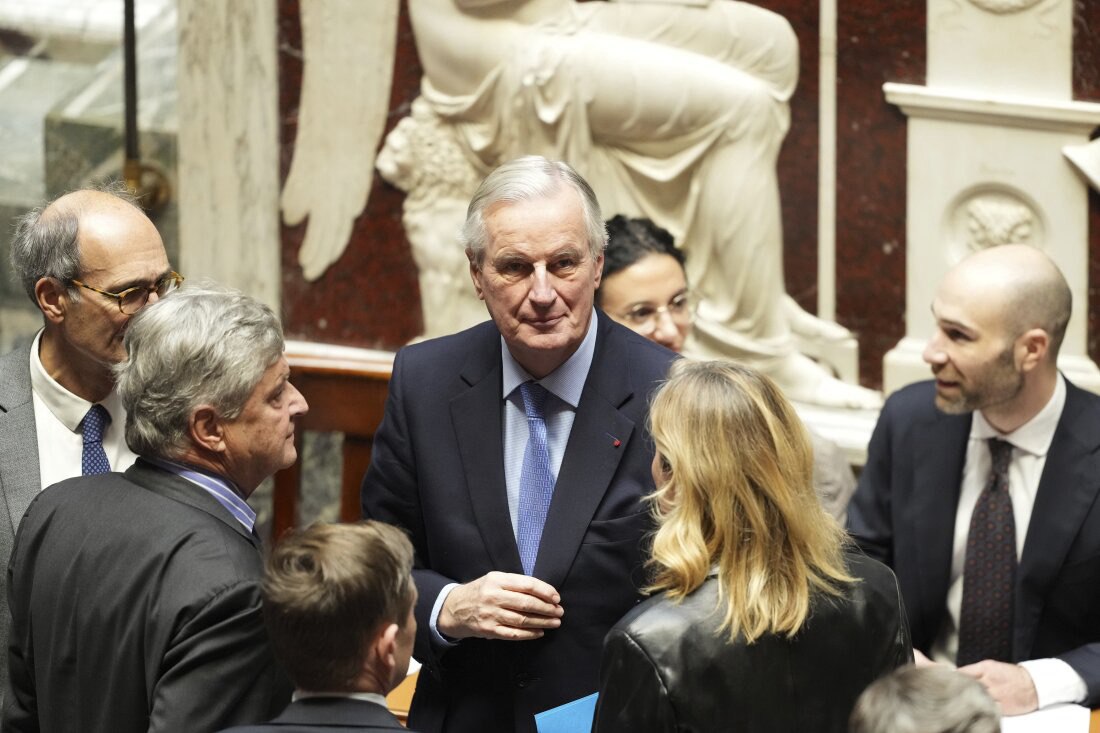How the French Government Fell
By Arsenii Glazunov | Published on December 5, 2024

On Wednesday, December 4th, 2024, France's now-former Prime Minister Michel Barnier lost a no-confidence vote, marking his tenure as the shortest in modern French political history. After protracted disputes over the budget, France’s political crisis has reached a new peak as the government now collapses, threatening to send shockwaves across Europe.
This story, perhaps, showcases many facets of human nature in politics—Machiavellian cynicism, youthful impulsiveness and arrogance, and the exploitation of political stability for personal gain.
To understand this crisis, we must rewind to June 2024, where it all began. The European Parliament election results revealed Marine Le Pen’s far-right National Rally (NR) as the clear victor, securing approximately 31.5% of the vote. This triumph posed a serious ideological challenge to Emmanuel Macron and his centrist Renaissance party, which came in a distant second.
Now, it is the role of a politician, especially at such a senior level, to assess challenges thoughtfully and arrive at measured conclusions. Yet Macron seemed to do the opposite. Within an hour of the election results, he announced a snap national legislative election.
It is hard to see this move as anything other than boyish impulsiveness and arrogance from the French president. Snap elections have traditionally been reserved as the last measure, used in the times of profound national urgency and necessity. Surely, a loss to a party so ideologically distinctive to his own might have dealt a heavy personal blow to Macron’s political vision, but this, perhaps, could also be a sign that there is not enough public mandate for his version of politics, making it almost impossible for him to achieve anything meaningful in the election. Even his close ally, former Prime Minister Gabriel Attal, became an unwitting casualty of this gamble, leaving his staff in literal tears.
The election, held in two rounds on 30th of June and 7th of July, delivered no surprises. Perhaps, the NR did not perform as well as they had expected, but Macron’s centrist coalition lost its majority in the National Assembly, finally plunging his country into a full-blown political crisis.
As it was actually the left-wing New Popular Front coalition that came on top after the election results came in, the new political battle over the appointment of the Prime Minister was bound to begin. After rejecting numerous candidacies suggested by the winning coalition, Macron set on the former EU’s chief Brexit negotiator Michel Barnier.
Dealt an impossible task of stabilising France's fractured government and improving the country’s dire deficit figures, Barnier’s job seemed to be rather impossible from the outside. After a few months this proved to be the case. While he managed to do an enormous job of keeping the ideologically various coalitions together during his tenure, the French Budget became the stumbling block.
Trying to mediate between the various coalitions and deliver the budget bill, sought to introduce €60bn in tax rises and spending cuts to align France closer to the EU’s fiscal rules, proved to be too difficult a task. Even giving major concessions on electricity taxes to Marie Le Pen was not enough to win her party over. Barnier then used his executive powers under article 49.3 of the French constitution to force the Budget through without parliamentary approval, thereby opening himself to a no-confidence vote.
Yesterday evening, Barnier lost this vote with 331 of France’s 577 lawmakers voting to oust the Prime Minister, therefore, extending the French political crisis. Another parliament dissolution, which could stabilise different ideological factions, is not an option either as Macron can’t call new elections until summer 2025, according to the French Constitution.
These events highlighted yet again Macron’s lack of political intuition - or simply sheer ignorance. As most people in life, in this story the French President does not change, as the French media reported him still believing that Barnier’s government would survive, just a day before its fall. Though, perhaps, Macron’s criticism of the NR being ‘way too cynical’ seems rather fair. France really is entering a new stage in their political crisis, which is not only limited to their nation but risks extending further to affect the whole European Union (EU).
France accounts for 16.6% of the EU's total GDP and the risk of its political crisis spiraling into a financial one looms large. Investors, recalling the Greek financial crisis, may now view France as a precarious bet. France could now be viewed as a risky investment because of the concern that a political crisis could evolve into a financial one if the rows over budget do not result in a meaningful bill passing the legislature.
Just with France the impact on the EU will be much more severe. The French economy is almost 12 times larger than that of Greece. If the crisis in the Mediterranean state heavily impacted the EU’s fiscal policy then France is bound to send shockwaves throughout Europe.
This political upheaval could hardly come at a worse time for Europe, which is in dire need of leadership. The common foreign policy goals of successfully dealing with Donald Trump’s second term in office, reacting to the conflict in Ukraine and addressing a potential trade row with China all seem under threat as Europe’s biggest states enter into severe crises. Germany is ill-equipped to take the reins too as Olaf Scholz coalition is bound to collapse.
This saga is so fascinating because, apart from its geopolitical significance, it gives an insight to the flaws of human nature of political actors. Macron's egotistical boyish impulsiveness, Marie Le Pen’s Machiavellian cynicism, and the emotional unraveling of Attal’s team all resemble many stereotypes about politicians. Perhaps, the only person who could emerge with some dignity is Michel Barnier, who showcased his political skills by holding a deeply divided French government together for a few months. Sadly, his political legacy will be that of the shortest-serving Prime Minister - but surely not many will blame him for that.